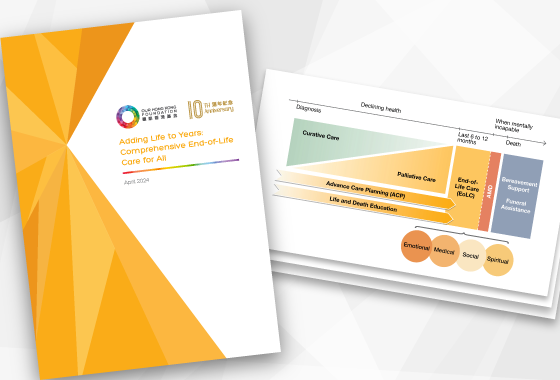Hong Kong must enhance TCM primary healthcare services
his article appeared originally in China Daily on 24 May, 2023.
Authors: Dicky Chow, Researcher, Nan Xia, Assistant Researcher, and Annabel Cho, Research Intern at Our Hong Kong Foundation
.jpg)
The Hong Kong Special Administrative Region government released the Primary Healthcare Blueprint in December 2022, proposing a systematic change in Hong Kong’s healthcare system from a treatment to a prevention orientation. Primary healthcare professionals need to work together to achieve this goal, and traditional Chinese medicine practitioners play a significant role in this.
In Hong Kong, it is common for residents to access primary healthcare services through TCM practitioners. A recent survey shows that 48.4 percent of respondents routinely seek TCM for preventative care. In addition, over 95 percent of registered TCM practitioners in Hong Kong are private practitioners, making them the primary source for residents to acquire TCM services. According to a thematic household survey on the health status of Hong Kong residents conducted by the Census and Statistics Department in 2020, more than 20 percent of residents who sought medical consultation within the 30-day period prior to enumeration went to private TCM practitioners, while less than 1 percent utilized the Hospital Authority’s TCM clinics.
To strengthen the role of TCM practitioners in primary healthcare, it is crucial for the government to utilize private TCM practitioners to serve as an important channel for residents to access primary healthcare services. The government proposed in the Primary Healthcare Blueprint to explore the use of strategic purchasing to allocate resources to enhance TCM primary healthcare services in Hong Kong. To achieve this goal, the government should develop comprehensive indicators when selecting TCM service providers, to assess their service capabilities, supply and quality, to ensure that residents receive high-quality TCM services. Furthermore, it is recommended that the government provide sufficient incentives to TCM practitioners to attract their participation and further enrich the workforce of primary healthcare professionals.
When applying strategic purchasing, the government should also consider the expansion of public sector services. Currently, the government provides TCM services in primary care settings mainly through Chinese Medicine Clinics cum Training and Research Centres (CMCTRCs). Although the government’s investment in CMCTRCs has continued to increase over the past five years, it is still less than 2 percent of Hong Kong’s public primary healthcare expenditure. At present, there is a shortage of public TCM services. Data shows that 18 CMCTRCs recorded more than 1.5 million visits in 2022. Although Chief Executive John Lee Ka-chiu proposed in the 2022 Policy Address to enhance the role of TCM by increasing the quota of subsidized TCM outpatient services to 800,000 per year, there is still a significant gap between the quota and the actual annual number of visits. A survey shows that 64.2 percent of respondents believe that the subsidized TCM services are insufficient.
It is recommended that the government explore the possibility of further increasing the quota of subsidized TCM outpatient services in different perspectives, including assessing CMCTRCs’ service capacity and financial implications, to enable more residents to access affordable TCM services in primary care settings.
Whether the services are provided in the private or the public sector, the government should enhance its information system to gather pertinent data for decision-making. The government has positioned the Electronic Health Record Sharing System (eHealth) as a free and lifelong electronic health record platform for all Hong Kong residents. Last year, the government launched EC Connect, which enables the sharing of TCM information to eHealth. However, according to Legislative Council papers, fewer than 90 TCM clinics are currently using EC Connect, indicating that there is still room for improvement. It is suggested that the government should strengthen the collaboration with TCM practitioners to increase promotional efforts, encourage them to use the system, and eventually inform policymaking in developing TCM at primary care settings through strategic purchasing.
TCM services have been deeply rooted in the community, serving residents for a long period of time. As an important part of Hong Kong’s healthcare system, the government should make more efforts in exploring TCM’s position, role and advantages in Hong Kong’s primary healthcare system, to meet residents’ needs, provide them with access to high-quality, multidisciplinary services, and comprehensive health protection.



